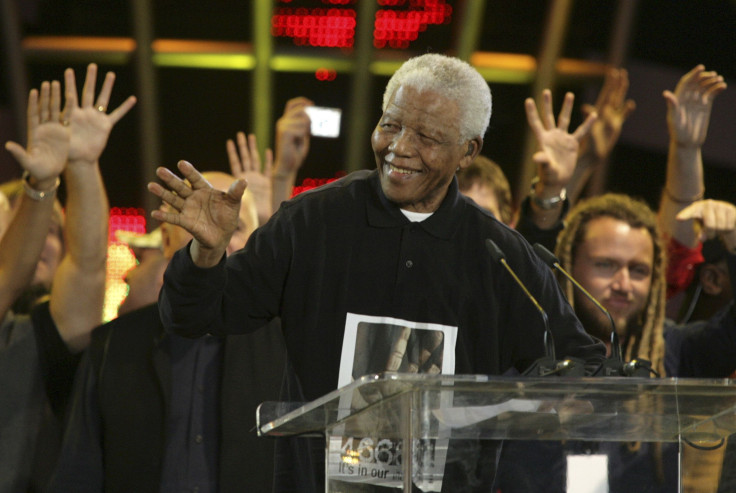Nelson Mandela's Speeches: Remembering Mandela With Four Of His Most Powerful Speeches

Nelson Mandela, the South African anti-apartheid leader who went from spending 27 years in prison to becoming the nation’s first black president, died in Johannesburg Thursday evening at the age of 95. Throughout his life, Mandela was an inspiring figure and powerful speaker who dedicated his time on earth to ending racial injustices in South Africa and across the world.
Tonight, remember four of Nelson Mandela’s most moving and impassioned speeches in words and video, from his time as an activist in the 1960s to his release from prison to his election to the presidency.
“I Am Prepared to Die” – Mandela at the Rivonia Trial
"During my lifetime I have dedicated my life to this struggle of the African people. I have fought against white domination, and I have fought against black domination. I have cherished the ideal of a democratic and free society in which all persons will live together in harmony and with equal opportunities. It is an ideal for which I hope to live for and to see realized. But, My Lord, if it needs be, it is an ideal for which I am prepared to die."
After a campaign of sabotage against government targets in conjunction with the group Umkhonto we Sizwe (Spear of the Nation), the armed wing of his African National Congress, Mandela was arrested, tried and sentenced to life in prison for conspiracy to overthrow the government at the Rivonia Trial. At the trial’s outset on April 20, 1964, Mandela delivered one of his most powerful speeches, explaining that he was prepared to give up everything, even his own life, for a free and equal South Africa.
Video of the speech does not appear to exist, but an audio copy of Mandela’s statement at the Rivonia Trial has survived and can be heard above.
“Our March to Freedom is Irreversible” – Mandela’s Release from Prison
"The majority of South Africans, black and white, recognize that apartheid has no future. It has to be ended by our own decisive mass action in order to build peace and security. The mass campaign of defiance and other actions of our organization and people can only culminate in the establishment of democracy. … Our march to freedom is irreversible. We must not allow fear to stand in our way. Universal suffrage on a common voters' roll in a united, democratic and non-racial South Africa is the only way to peace and racial harmony."
After 27 years in prison, Mandela was finally released on Feb. 2, 1990, as newly elected South African President F.W. de Klerk began working to end apartheid. Days after he was released, Mandela appeared on the steps of Cape Town’s City Hall, delivering a speech emphasizing his commitment to peace and to building a new South Africa.
“An Injury to One is an Injury to All” – Mandela’s Nobel Peace Prize Acceptance Speech
"I am also here today as a representative of the millions of people across the globe, the anti-apartheid movement, the governments and organizations that joined with us, not to fight against South Africa as a country or any of its peoples, but to oppose an inhuman system and sue for a speedy end to the apartheid crime against humanity. These countless human beings, both inside and outside our country, had the nobility of spirit to stand in the path of tyranny and injustice, without seeking selfish gain. They recognized that an injury to one is an injury to all and therefore acted together in defense of justice and a common human decency. Because of their courage and persistence for many years, we can, today, even set the dates when all humanity will join together to celebrate one of the outstanding human victories of our century."
Immediately after Mandela’s release from prison, he began working to broker the end of apartheid. Throughout 1990, Mandela spoke to President George H.W. Bush, the United States Congress, Pope John Paul, Margaret Thatcher and other world leaders on the importance of ending apartheid. In 1991 and 1992, Mandela was a key figure at the Convention for a Democratic South Africa (CODESA) talks, calling for a unitary government based on majority rule. The next year, Mandela and President de Klerk were jointly awarded the Nobel Peace Prize for their commitment to ending apartheid peacefully.
Video of Mandela’s acceptance speech is available on the Nobel Prize website.
“A New Era for Our Country” – Mandela’s Inaugural Address
"Today we are entering a new era for our country and its people. Today we celebrate not the victory of a party, but a victory for all the people of South Africa. … Democracy is based on the majority principle. This is especially true in a country such as ours where the vast majority have been systematically denied their rights. At the same time, democracy also requires that the rights of political and other minorities be safeguarded. … The task at hand on will not be easy. But you have mandated us to change South Africa from a country in which the majority lived with little hope, to one in which they can live and work with dignity, with a sense of self-esteem and confidence in the future."
Just one year after winning the Nobel Peace Prize, Mandela was overwhelmingly elected president of South Africa in the 1994 general election, the first where all races could vote. His election is widely considered the official ending point of apartheid, and at his inaugural address, Mandela promised a new era for his nation. The day of the election, April 27, is now a public holiday known as Freedom Day in South Africa.
© Copyright IBTimes 2024. All rights reserved.





















